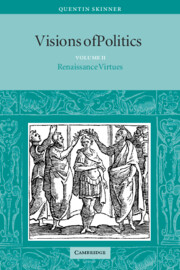Book contents
- Frontmatter
- Contents
- List of plates
- General preface
- Full contents: Volumes 1–3
- Acknowledgements
- Conventions
- 1 Introduction: The reality of the Renaissance
- 2 The rediscovery of republican values
- 3 Ambrogio Lorenzetti and the portrayal of virtuous government
- 4 Ambrogio Lorenzetti on the power and glory of republics
- 5 Republican virtues in an age of princes
- 6 Machiavelli on virtù and the maintenance of liberty
- 7 The idea of negative liberty: Machiavellian and modern perspectives
- 8 Thomas More's Utopia and the virtue of true nobility
- 9 Humanism, scholasticism and popular sovereignty
- 10 Moral ambiguity and the Renaissance art of eloquence
- 11 John Milton and the politics of slavery
- 12 Classical liberty, Renaissance translation and the English civil war
- 13 Augustan party politics and Renaissance constitutional thought
- 14 From the state of princes to the person of the state
- Bibliographies
- Index
- Plate section
12 - Classical liberty, Renaissance translation and the English civil war
Published online by Cambridge University Press: 05 September 2012
- Frontmatter
- Contents
- List of plates
- General preface
- Full contents: Volumes 1–3
- Acknowledgements
- Conventions
- 1 Introduction: The reality of the Renaissance
- 2 The rediscovery of republican values
- 3 Ambrogio Lorenzetti and the portrayal of virtuous government
- 4 Ambrogio Lorenzetti on the power and glory of republics
- 5 Republican virtues in an age of princes
- 6 Machiavelli on virtù and the maintenance of liberty
- 7 The idea of negative liberty: Machiavellian and modern perspectives
- 8 Thomas More's Utopia and the virtue of true nobility
- 9 Humanism, scholasticism and popular sovereignty
- 10 Moral ambiguity and the Renaissance art of eloquence
- 11 John Milton and the politics of slavery
- 12 Classical liberty, Renaissance translation and the English civil war
- 13 Augustan party politics and Renaissance constitutional thought
- 14 From the state of princes to the person of the state
- Bibliographies
- Index
- Plate section
Summary
Shortly after the publication of Hobbes's Leviathan in the spring of 1651, Benjamin Worsley received a letter from his friend William Rand expressing strong agreement with one important element in Hobbes's argument. ‘I am of opinion & have long bin with Mr Hobbs,’ Rand wrote, ‘that the reading of such bookes as Livy's History has bin a great rub in the way of the advancement of the Interest of his Leviathanlike Monarchs.’ Hobbes's judgement to this effect had been delivered in chapter 21 of Leviathan, in which he had presented it in the form of a cautionary tale about the origins of the English civil war:
It is an easy thing, for men to be deceived, by the specious name of Libertie; … And when the same errour is confirmed by the authority of men in reputation for their writings in this subject, it is no wonder if it produce sedition, and change of Government. In these westerne parts of the world, we are made to receive our opinions concerning the Institution, and Rights of Common-wealths, from Aristotle, Cicero, and other men, Greeks and Romanes, … And by reading of these Greek, and Latine Authors, men from their childhood have gotten a habit (under a false shew of Liberty,) of favouring tumults, and of licentious controlling the actions of their Soveraigns; and again of controlling those controllers, with the effusion of so much blood; as I think I may truly say, there was never any thing so deerly bought, as these Western parts have bought the learning of the Greek and Latine tongues.
- Type
- Chapter
- Information
- Visions of Politics , pp. 308 - 343Publisher: Cambridge University PressPrint publication year: 2002
- 1
- Cited by

